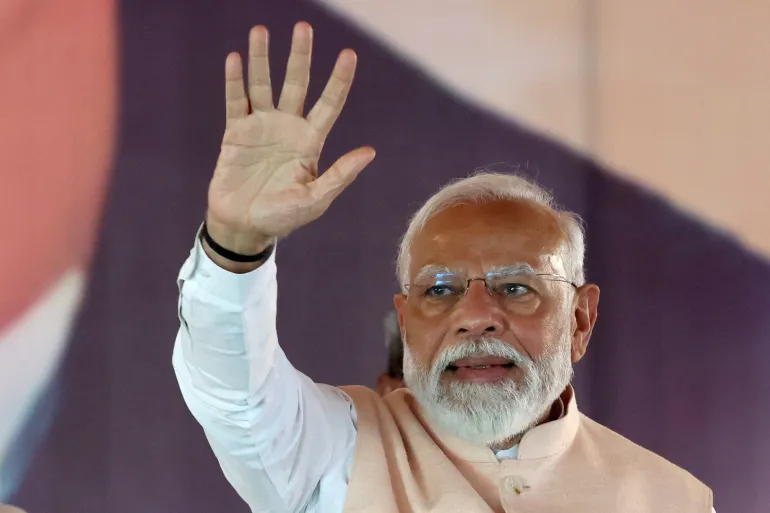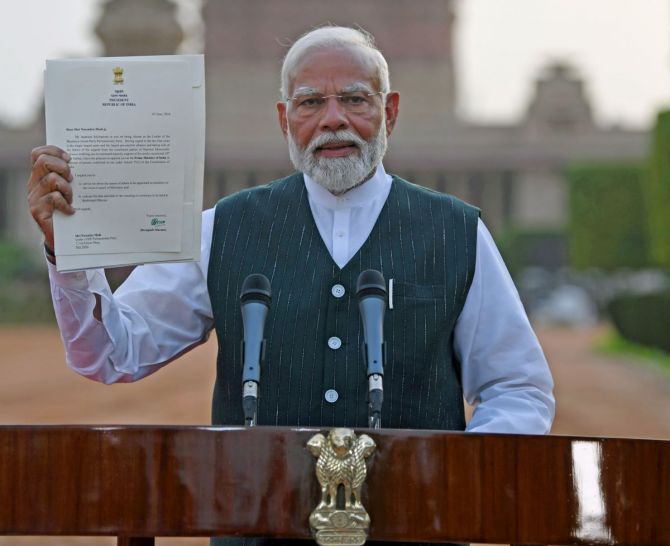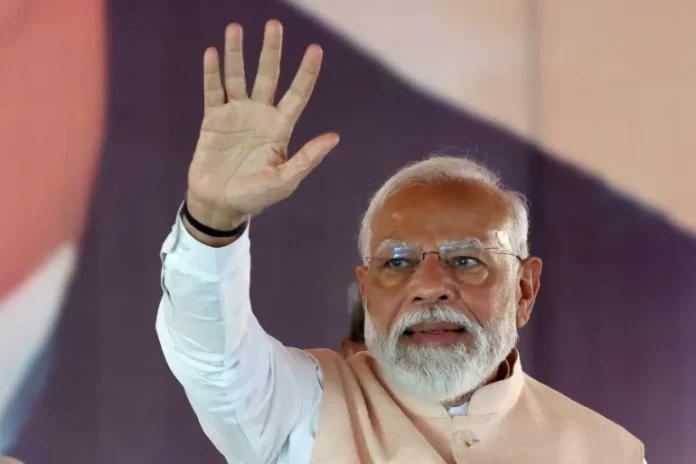Prime Minister Narendra Modi Makes History by Winning Third Term as India’s in 2024.

Introduction
The 2024 general elections in India showcased a groundbreaking moment in the country’s political history as Narendra Modi secured his third consecutive term. This election not only underscored Modi’s enduring popularity and that of his Bharatiya Janata Party (BJP) also highlighted the evolving dynamics of Indian democracy. Despite the BJP falling short of a simple majority, Modi’s leadership within the National Democratic Alliance (NDA) ensured continuation in office, solidifying his legacy as one of India’s most influential leaders.
Background and Context of Prime Minister
Narendra Modi initially gained national prominence in 2014 when he led the BJP to a decisive victory, ending a decade-long rule by the Indian National Congress (INC). His charismatic leadership, focus on development, and strong nationalist rhetoric resonated with a wide segment of the Indian electorate. The 2019 elections further cemented his power, with the BJP securing an even larger majority. However, the political landscape had significantly shifted by the time of the 2024 elections.
The intervening years witnessed significant challenges for the Modi government, including economic downturns, the COVID-19 pandemic, and escalated tensions on the India-China border. In the lead-up to the 2024 elections, these issues, paired with allegations of weakening democratic norms and growing polarization, set the stage for a closely watched election. Despite the hurdles, Modi’s personal popularity and the BJP’s organizational prowess remained strong.
The Election Campaign
The 2024 election campaign was characterized by fierce competition and high stakes. Modi and the BJP highlighted their achievements, particularly in infrastructure development, digital transformation, and foreign policy. Key government initiatives like the Ayushman Bharat healthcare scheme, the Pradhan Mantri Awas Yojana (housing for all), and notable progress in rural electrification and sanitation were emphasized.
Modi’s campaign also stressed national security and strong leadership, leveraging his image as a decisive leader. The narrative of a robust, self-reliant India, encapsulated in the slogan “Atmanirbhar Bharat” (self-reliant India), played a central role in the BJP’s messaging.
Conversely, the opposition, led primarily by the Indian National Congress and its allies in the Indian National Developmental Inclusive Alliance (INDIA), sought to counter Modi’s narrative by focusing on economic hardships, unemployment, and social justice issues. Rahul Gandhi, the Congress party leader, presented an alternative vision centered on inclusive growth, welfare, and the reinforcement of democratic norms.
Election Results
The election results mirrored a nuanced political landscape. While the BJP remained the largest single party, it fell short of securing a simple majority on its own, winning 267 seats, a decrease from its previous tally. Nevertheless, the NDA coalition, comprising various regional partners, retained a working majority, allowing Modi to continue as PM.

The opposition alliance, INDIA, made significant strides, with the Congress party boosting its seat count to 140, marking its best performance in a decade. This resurgence signaled a more competitive and diverse political environment, with regional parties and new alliances playing pivotal roles.
Modi’s Leadership and Vision for the Future
Narendra Modi’s third term is poised to build upon his vision for India, albeit with fresh challenges and priorities. His agenda includes advancing economic reforms, bolstering infrastructure, and enhancing India’s global standing. The Modi government is set to push forward with its digital India initiatives, aiming to position the country as a global technology hub.
Economic recovery post-COVID-19 remains a focal point, with efforts directed towards revitalizing key sectors like manufacturing, agriculture, and services. The government also intends to strengthen social welfare programs, ensuring wider access to healthcare, education, and housing.
Modi’s foreign policy is expected to maintain an assertive stance, prioritizing stronger ties with major global powers and asserting India’s strategic interests in the Indo-Pacific region. The “Neighborhood First” policy, aimed at bolstering regional cooperation and stability, will remain central to his diplomatic endeavors.
Challenges and Criticisms
Despite his electoral triumph, Modi’s third term will not be devoid of challenges. The Indian economy, while on the path to recovery, grapples with structural issues such as unemployment, income disparity, and rural distress. Addressing these challenges necessitates comprehensive policy measures and effective implementation, areas where the government has encountered criticism.
Social cohesion poses another significant challenge. India has witnessed heightened polarization and social tensions, with detractors accusing the Modi government of promoting divisive policies. Ensuring harmony and inclusive development in a diverse society will be a critical test for his administration.
Moreover, concerns regarding democratic governance and institutional integrity have been contentious. Allegations of eroding democratic norms, undermining independent institutions, and curtailing freedoms have marred Modi’s tenure. Striking a balance between strong leadership and upholding democratic principles will be crucial in preserving India’s democratic fabric.
The Role of Opposition
The opposition’s performance in the 2024 elections signifies a more balanced and competitive political landscape. The Congress party, under Rahul Gandhi, has demonstrated resilience and adaptability, addressing core issues like economic distress and social justice. The success of the INDIA alliance underscores the significance of regional parties and coalitions in shaping national politics.
The opposition’s role in holding the government accountable and presenting alternative policy perspectives will be pivotal. A robust opposition can enhance democratic governance, ensuring diverse voices and interests are represented in the policymaking process.
Conclusion
Narendra Modi’s third term as India’s PM heralds a significant chapter in the country’s political journey. His leadership, characterized by a mix of charismatic authority and developmental ambition, continues to influence India’s trajectory. As India navigates the challenges of the 21st century, Modi’s government must address pressing economic, social, and governance issues while fostering an inclusive and democratic society.
The 2024 elections reflect a dynamic and evolving democracy, marked by increased participation, competitive politics, and robust public discourse. The path forward for India under Modi’s leadership will hinge on how effectively these challenges are tackled and how inclusive and sustainable the nation’s development can be.
In this new term, maintaining a balance between strong leadership and democratic principles will be crucial. Modi’s ability to adapt to the shifting political landscape, tackle critical issues, and unite a diverse nation will ultimately shape his legacy and India’s future.



